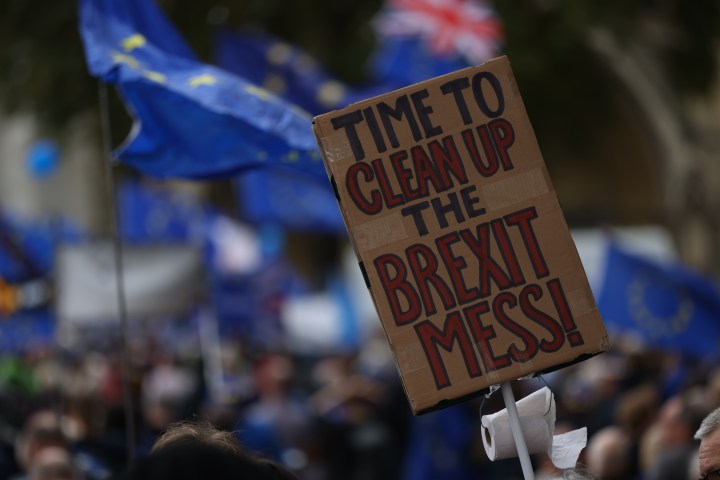
Is Brexit to blame for Britain’s mess?

Britain has been an object of international derision in recent months.
In September, after the forced departure of Prime Minister Boris Johnson, a new government unveiled a mini-budget that planned deep cuts in taxation to be paid for by borrowing billions. That sent bond yields soaring, the pound plunging, and trashed the country’s reputation for fiscal prudence. The resignation of the new prime minister, Liz Truss, after only six weeks in office, and the arrival of the fourth finance chief in as many months, created an impression of political chaos.
Britain, said some outside observers, had turned into an emerging market — even a banana republic. But why has a country, traditionally renowned for its stability, been engulfed by such turmoil?
Brexit is the reason, according to critics of Britain’s departure from the European Union.
“I call it ‘Britastrophe,’“ said business consultant, author, musician and anti-Brexit campaigner Peter Cook. “Brexit has been a disaster and COVID has been a crisis. If you put a crisis and a disaster together, you get a catastrophe. ‘Britastrophe’ has divided and weakened the country politically and economically.”

Since the referendum vote to leave the EU more than six years ago, Cook has fought a long campaign to reverse that decision, composing and recording more than 60 anti-Brexit songs with titles like “Bad Brexit Boogie.” He doesn’t believe he’s been wasting his breath, especially after the fiasco of the mini-budget.
“Britain will rejoin the bloc eventually,” he said.” It’s almost inevitable because Brexit has consumed four prime ministers so far, and it’s consuming our economy.”
Brexit, he said, knocked international confidence in the United Kingdom and damaged the country’s credibility.
“People laugh at us a lot now, or many of them pity us and say: ‘What have you done?’ and ‘Why?“ Cook said.
Departure from the bloc, Cook said, has caused particularly deep divisions in the ruling Conservative party, leading ultimately to the mini-budget debacle that almost crashed the economy. He blames Brexit for a lot of the U.K.’s economic ills.
“Our lack of resilience due to Brexit is the underlying factor. We’re no longer able to absorb shocks.”
Mark Carney, former governor of the Bank of England, would agree with that. In an interview with the BBC, Carney said that Brexit had driven down the value of the pound even before the mini-budget, and that had pushed up inflation, forcing the central bank to hike interest rates higher than might otherwise have been the case. Brexit, he argued, had slowed the pace at which the U.K. economy can grow.
Trade in the U.K. appears to have been affected too. U.K. exports to and imports from the EU today appear to be lower than they would have been had the U.K. remained a member state, according to a recent study.
Darren Price, who helps run British Boxers, a small family clothing firm, believes this is an accurate assessment of the hampering effects of Brexit. He has encountered a lot more paperwork and complications in dealing with the bloc.
“Any business like ours that operates trading across Europe has increased costs and therefore decreased profitability. And it makes it harder to operate,” he said.
Price hated Brexit, but he doesn’t think that after all the trauma of leaving, the U.K. will rejoin the bloc. However, he said it should and probably will rejoin a part of it: the EU’s regulatory system, the single market.
“I do think a closer relationship with Europe is absolutely essential,” he said.
Ardent Brexiteers, of course, take the opposite view. We caught up with one of them hard at work in a storage depot in London. Gawain Towler was unloading a consignment of books, posters, flyers and other exhibits for a planned Museum of Brexit.

“We’re gathering a whole range of documents and artifacts that will tell the story of how the U.K. came to make the momentous decision to leave the EU,” he said. “What we’re hoping to do is ensure there is a memory, an institutional, academic memory of why it happened.”
It happened, Towler said, because the British people decided they wanted to be a fully independent nation again. He’s ticked off about the recent upsurge of complaints from “remainers.”
“They’re ramping up a rather monotonous drone: ‘Brexit will never succeed, Brexit will always fail, Brexit is to blame for everything, all our problems.’”
The pandemic and the invasion of Ukraine are the main sources of Britain’s current problems, he said — not Brexit. And anyway, he said, the U.K. is not that much worse off economically than many of its international competitors. And, in some respects, it’s doing a little bit better: Its inflation rate is lower than that of the eurozone average, interest rates are higher in the United States and the U.K. government’s debt-to-GDP ratio is the second lowest in the G7.
The U.K. has many problems, including low productivity compared with many other developed economies. But Towler insisted he was never under any illusion that leaving the EU would deliver instant Nirvana.
“Brexit was never going to cure all our ills overnight,” he said. “Of course it wasn’t. And you’d be nuts to think it was.”
Nevertheless, many Brexit supporters, especially in the business world, are deeply critical of the way the U.K.’s departure from the bloc has been handled by the British government.
“Am I sad we’ve left the EU? No,” said Steve Hardeman, boss of the Clevedon Fasteners rivet-making company in the English Midlands. “But am I very, very disappointed with the political class? Yes, I am.”
Hardeman, a passionate believer in the potential of British manufacturing, describes himself as a “despondent Brexiteer.” He blames the two conservative governments that followed the referendum for failing to secure a good exit deal with the EU and failing to take advantage of the opportunities that Brexit offers — by significantly reducing regulation and boosting global trade. He’s also dismayed by the bungled mini-budget of the fleeting Liz Truss government.
“We have such poor politicians. They cannot grasp the issues that are facing us. They haven’t got a clue,” Hardeman declared.
One issue on which many remainers and Brexiteers agree is that the British government has been a shambles over recent months. And this time, the politicians have had nowhere to hide. They can hardly blame Brussels for the turmoil after Brexit.
There’s a lot happening in the world. Through it all, Marketplace is here for you.
You rely on Marketplace to break down the world’s events and tell you how it affects you in a fact-based, approachable way. We rely on your financial support to keep making that possible.
Your donation today powers the independent journalism that you rely on. For just $5/month, you can help sustain Marketplace so we can keep reporting on the things that matter to you.

















